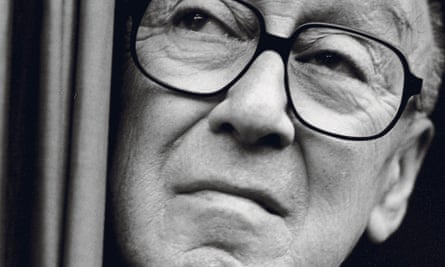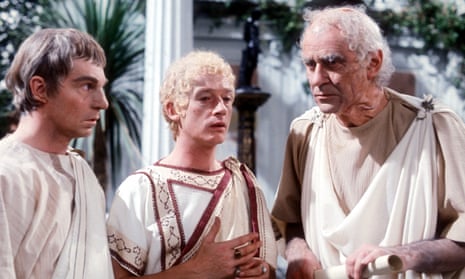The film and television director Herbert Wise, who has died aged 90, made an impressive contribution to television drama over five decades. Most notably, he earned plaudits (and Bafta and Emmy nominations) as the director of all 13 episodes of I, Claudius (1976), the Robert Graves adaptation starring Derek Jacobi; but his credits appeared on a wide range of programmes, including Z Cars, Upstairs Downstairs, The Norman Conquests, Rumpole of the Bailey, Breaking the Code, and both The Woman in White and The Woman in Black. In 1979 he won a Bafta for his outstanding service to television.
As Herbert Weisz, he arrived in Britain in January 1939 on the Kindertransport, a 14-year-old Jewish refugee from Vienna without a word of English. He was fostered by the family of a wealthy Surrey accountant, who almost immediately inflicted Herbie’s first culture-shock with the offer of a hot drink. Herbie, dreaming of coffee or chocolate, lifted the steaming mug to his lips and cried out in dismay. It was Bovril.
Six months later, on the eve of war, his younger brother, Roland, followed him to Britain. Their parents, Julia and Salamon, resigned themselves to never seeing their sons again. In the event they were able to get to Italy and thence to South America, but it was to be many years before the family was reunited.

At first, Herbie conversed in French until, with the help of Winnie the Pooh, he mastered English at his secondary school in Oxted. Keen to make a contribution to the war effort, he left his foster family at 16 to work in a chemical laboratory. As soon as he was able, he joined the RAF and was later co-opted into military intelligence.
On demobilisation, he determined to try for a career in the theatre and while training at the New Era Academy in Hampstead, north London, anglicised his name to Wise. We first met when I was drama critic-cum-late-shift reporter on the Scottish Daily Mail and he was director of Dundee Repertory theatre. The theatre-goers of Dundee were more used to Bunty Pulls the Strings than Wise’s choice of Noah by André Obey. But with The Dashing White Sergeant, a new Scottish light comedy, and a rousing production of The Tempest, in which, because of repertory theatre economics, he memorably acted himself, he wooed audiences.
In 1956 he won a place on the training course set up by Granada TV in preparation for going on the air. Despite his theatrical experience, Wise was assigned to outside broadcasts but manoeuvred himself into drama via The Verdict is Yours, a series of improvised trials presented as live relays from the fictional Birkenhead Assizes. After creative differences with Sidney Bernstein, the Granada chairman, he was summarily sacked, but, satisfyingly, won acclaim soon afterwards with a civil war epic for BBC2, The Siege of Manchester (1965), set in the very heart of the region Bernstein liked to regard as Granadaland.
The big-time loomed with Walk with Destiny (1974), a BBC-American co-production derived from Churchill’s The Gathering Storm (and released under that title in the US). Richard Burton, tracked down in Mexico, not only agreed to play Churchill but promised to go on the wagon to do so. He was as good as his word – until BBC TV threw a big reception to welcome him. Its flamboyant managing director Huw Wheldon, Wise wryly recalled, made a speech which ended with his bidding everyone to raise their glasses – “And that goes for you, too, Richard” – in a toast to success. Burton reached for a double vodka. When shooting began, he could scarcely remember a line at a time.
Wise worked with some of the biggest names in the business. He directed Danny Kaye in Skokie (1981, known in the UK as Once They Marched Through a Thousand Towns), which earned him an Emmy nomination and a Directors Guild of America award; Albert Finney in Pope John Paul II (1984); Robert Mitchum and Deborah Kerr in Reunion at Fairborough (1985); and Anthony Hopkins in One Man’s War (1991).
Throughout the 1980s and 90s he directed episodes of crime series featuring Inspectors Dalgleish, Morse, Wexford, Van der Valk and Frost. His many one-off productions included The Christmas Tree (1986) and Strange Interlude (1988), which starred Glenda Jackson and a young Kenneth Branagh. Recently he had returned to US television to direct the miniseries The 10th Kingdom (2000).
In 1963 he married the actor Moira Redmond. They divorced in 1970. In 1988 he married the actor Fiona Walker, after they had lived together for 17 years. For some years they had a second home in Northamptonshire, where for the annual village fete Wise would bake Viennese loaves, always a sell-out. “Just brown bread,” he would say, modestly, “with a few little extras I add.”
Their main home remained in Archway, north London. Wise was a keen amateur astronomer, whose 80th birthday was celebrated at Greenwich Observatory. Prison reform had been his lifelong passion, and on retirement he became a prison visitor.
Fiona, and their son, Charlie, and daughter, Susannah, survive him.

Comments (…)
Sign in or create your Guardian account to join the discussion